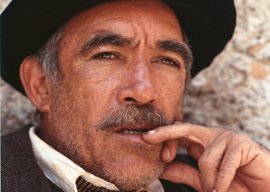
February 26, 2012

Anthony Quinn
But Anthony Quinn, who was born in Mexico and raised in Boyle Heights, was closer to the real deal. He won Supporting Actor Oscars for playing the brother of the Mexican revolutionary in 1952’s Viva Zapata! and for playing Paul Gauguin in 1956’s Lust for Life. The studio publicity department stylized him as half-Irish; in truth, three of his grandparents were born in Mexico and only one in Ireland.
That Quinn was a mestizo made him more valuable in Hollywood, since he could plausibly play a huge range of races, from Indian chiefs to Greek fishermen to Bedouin sheiks to Ukrainian popes. If you wanted to make a mainstream movie about, say, Eskimos, you could always put famous Oscar-winning movie star Anthony Quinn in your lead role.
But as the number of Mexican Americans has mounted to over 30 million, their Oscar recognition has dwindled. The last Mexican American nominee was Edward James Olmos as calculus teacher Jaime Escalante in 1988’s Stand and Deliver. Gregory Nava is the only Mexican American screenwriter given a nod, for El Norte in 1983. John A. Alonzo was nominated for Chinatown‘s superb cinematography in 1974.
A growing number of honorees are alumni of Mexico City’s film and television industry, such as Emmanuel Lubezki, nominated for filming Terrence Malick’s The Tree of Life, or Demián Bichir, who received a surprise Best Actor nod for playing an illegal-immigrant gardener in Chris Weitz’s box-office flop A Better Life.
But there hasn”t been an American-raised Oscar nominee of Mexican descent for 23 years, unless you want to count Susan Kohner’s sons, the Weitz Brothers, who were nominated for writing About a Boy in 2002. But though their 101-year-old actress grandmother was born in Mexico, Chris and Paul Weitz aren”t exactly representative Mexican Americans. Their Berlin-born Jewish father was the late John Weitz“fashion designer, racecar driver, best-selling novelist, yachtsman, spy, and dandy.
Hollywood types appear to assume that since they are by definition Nice, they are immune to being smeared with Not Nice terms such as “disparate impact.” That the Hollywood craft unions remain nepotistically white isn”t a problem for them. Nor do they feel guilty to insist ambitious young people must intern without pay, which discriminates against Latinos, who tend to hate working for free. While blacks and gays are lavished with attention, Mexican Americans remain the Academy’s invisible people.